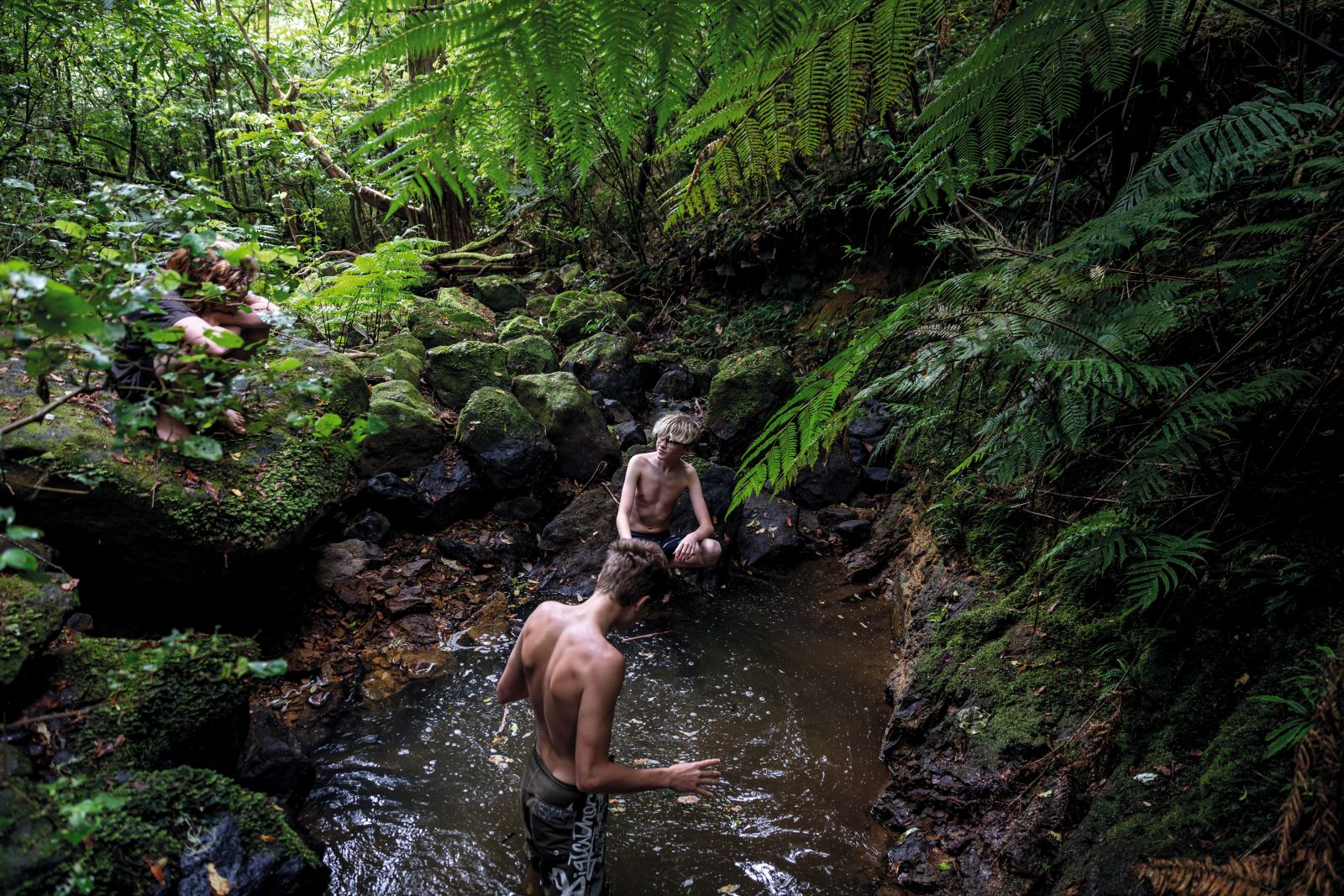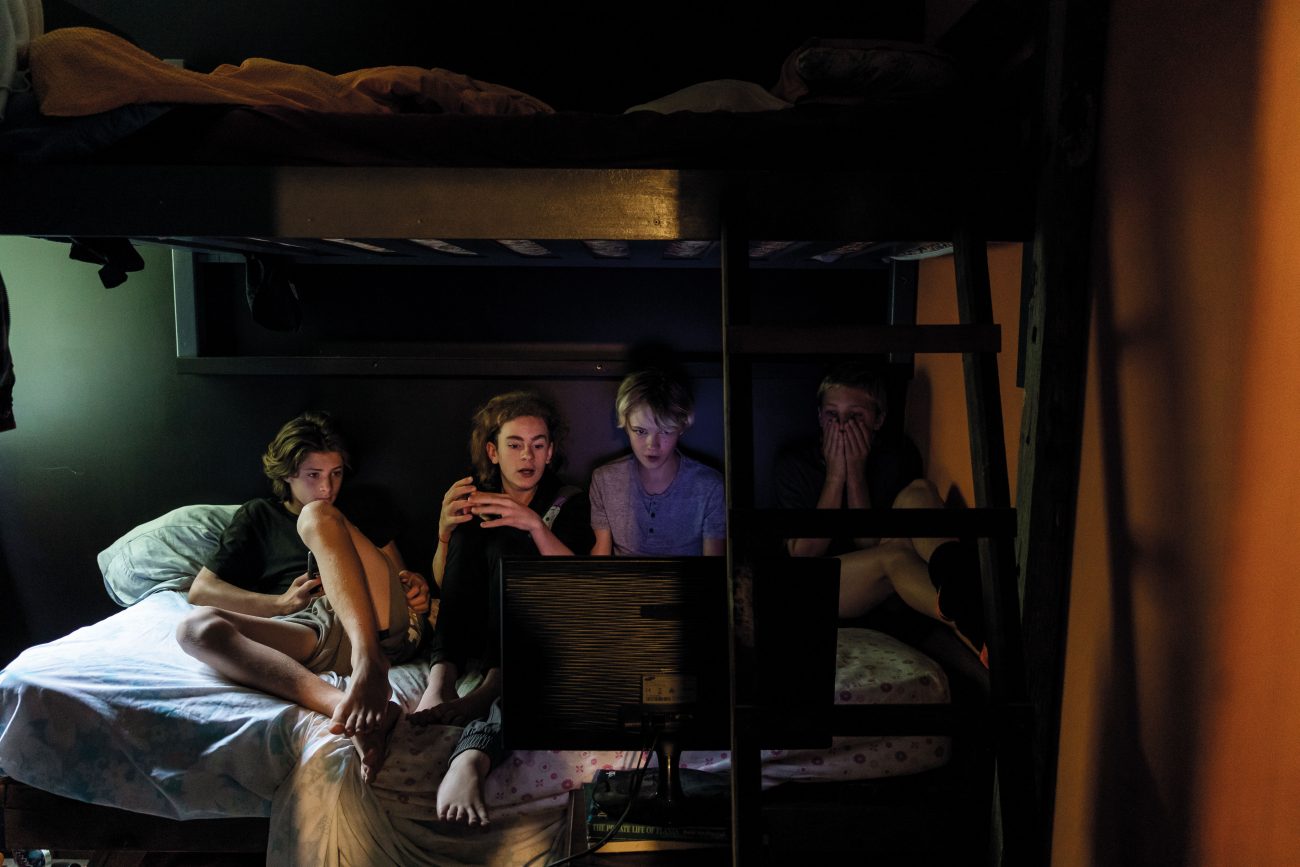
A custom-built life
The world according to Jaxon Brian Storm Czepanski, 14.
Here is a teen comfortable in his own bones: he greets me with a hug and then sprawls, all limbs, bright eyes and changeling hair, on a red velvet sofa.
Jaxon is sixth in the line-up of seven Czepanski kids. His earliest memories are of a huge banyan tree, rides in rickshaws and swimming with snakes—his parents, who are passionate about social justice, moved the family to Bangalore, India, to take up mission work. After Jaxon turned three, the family returned to Aotearoa and spent two years living in two campervans, travelling the country. Bangladesh was next: Jaxon called Dhaka and then Chandpur home when he was 11. He loved the family’s compound and life there but the pandemic forced them home early, to their modest house, on a main drag in Auckland’s Papakura.
Jaxon shared a room with younger brother Deejay until a few years ago. His bedroom is a small kingdom, created with great attention to detail. His father Dave and siblings helped design and engineer his wooden desk, gaming chair, and microphone. Two sides of the room are more window than wall so it’s rare that he opens the curtains: Any gamer knows glare and screens don’t mix, and there is something comforting about the cave-like space.
A sharp design aesthetic extends beyond the walls of his room. His plating skills are Czepanski-famous. He makes us coffee on the impeccably maintained machine his parents and siblings chipped in to buy him for Christmas. He is planning to retrofit a van to live in.

In the meantime, he’s eyeing up his brother Levi’s larger room across the hall.
“I could customise that room so much,” he says longingly, making the case that the room should be his since his brother is always at work, out with friends or just sleeping. Levi is not convinced.
With parents working remotely and five siblings in employment, the concept of earning money is not the daunting prospect it is for some teens. Jaxon intends to follow in his brother’s footsteps and work at the local Bunnings when he turns 15, to save up for his van. He loves taking photos and has a keen eye; he is trying on the idea of being a photographer. It would dovetail nicely with the van life, he reckons.
“It depends on how my life evolves.”
Scroll through Jaxon’s shots and what becomes obvious is a deep appreciation of his friends, nature and the minutiae of life. He talks about the time he stood starstruck at a brilliant night sky, and describes in unusual detail a leaf moving beautifully in the wind.
“If there was a camera in my eyes that captured what I see, that would be an amazing photo,” he says. “I wonder sometimes if humans will ever invent a camera that captures that.”
[Chapter Break]
Mum Jodi shares, with Jaxon’s permission, that he was “withdrawn as a littlie”, didn’t seek out physical affection, avoided eye contact and struggled with small talk. His handwriting ignored convention despite his best efforts. When he was seven, they learned Jaxon was dyslexic and had traits of autism. But Jaxon is lucky. His life suits him. His home environment is flexible and low-stress, and he has always been homeschooled. The assessing psychologist thought that without those supports he might have struggled, perhaps needing a formal diagnosis to access learning support.
New Zealand doesn’t track autism diagnoses or prevalence. It’s convention to instead extrapolate from overseas data, which suggests one to two per cent of the population is autistic. That’s between 50,000 and 100,000 people.
International data also shows diagnoses are rising—which, given the natural diversity of human brains, and the fact that autism is strongly hereditary, likely means that we’re getting better at identifying it. We’re also finding new ways to talk about neurodivergence. Six years ago, as part of his work producing Te Reo Hāpai, a te reo glossary for use in the mental health, addiction and disability sectors, Keri Opai created two new words that have Jaxon’s mum nodding in approval. For autism, takiwātanga, which translates as “in his or her own time and space”; for ADHD, another common form of neurodivergence, aroreretini, “attention goes to many things”. Both reflect an acceptance and refreshing lack of judgement; that’s an attitude today’s teens seem to have landed on instinctively.


On his dyslexia, Jaxon says, “It doesn’t bother me that much because it’s only mild. I don’t like reading or writing. At Sunday School at church, everyone in our group had some level of dyslexia. Basically, we had to read something but since we’re all dyslexic we were all, like, ‘I don’t want to read’, so everyone just read a little bit. It was funny and cool that everyone was open about it.”
He has not been tempted to research dyslexia or any other neurodivergence. “Mmm, no, because it affects everyone differently. You kind of have to just experience it.”
To explain how his brain works, he shares how he deals with the word “dog”. “It’s D-O and then G for me. I basically work everything phonetically.
“Then there’s that other part of dyslexia, it just affects everything. Everyone thinks it’s spelling, reading, writing, but there’s quite a bit more.
“I don’t remember names… My brain is not good with numbers. I didn’t remember my birthday until I was 12.” He trained himself to remember by changing the lyrics of an earworm song to include his birthdate.
“I think Deejay’s birthday is in November. Levi? No idea. Caleb’s? No idea.”
This remarkable boy is not upset with himself, or worried about how he’ll remember important dates as an adult. He knows he has the technology to scaffold any challenges.
His parents are open to his going to school if he chooses, just as he has the choice to go to church (they attend Manukau City Baptist Church) or not. But so far, homeschooling has given him the freedom to learn through his interests, in ways that work for his brain.
[Chapter Break]
Jaxon’s best friend is Reef, another homeschooler. The friendships between their families go back before Jaxon was born—and now endure across geographic distance. Two years ago, Reef’s family became guardians of rural land in the Bay of Islands. They ousted the sheep to create Ruru Rākau, a sanctuary for native wildlife—and teenagers—in need. (The family asked us not to publish their last name, or the location of their land.)
Jaxon goes up every chance he can. I drive north between devastating summer rains and find him in his element, framed against the green of the juvenile permaculture food forest, treasured Nikon D3100 around his neck. He’s brimming with stories of all-night card games, fish and chips on the beach, New Year’s Eve antics. He is more gracious than might be expected regarding the lack of coffee beans and accompanying paraphernalia.
This place is an intentional sanctuary and it’s for more than just family and friends. Young people needing a break from tense family life, a new perspective, or with nowhere else to go are welcomed. Everyone gets fed. Everyone pitches in.
One of the sheds is set up with an array of tools the teens are learning to use and are trusted to sharpen. When I arrive, Jaxon and his friends are sprinkled with sawdust. They’ve spent the day removing the bark and sanding the surface of a Casuarina log. It will be a key piece of the framing for new sleeping quarters. In all of Ruru Rākau, but especially the shed, honest mistakes are respected as learning opportunities, and dickhead manoeuvres and disrespect get called out, with older teens guiding and supporting as much as the adults.

Jaxon has deep ties and conversations with people of all ages. Large families, church and homeschool life are good for that. He’s especially comfortable with Reef: “There’s never an argument; we say our thoughts and we just respect our things.”
At home, Jaxon’s friends live at least half an hour’s drive away, so connecting through gaming is a big part of his world. “I prefer doing everything with people—so what do you do? Go online!”
He moves fluidly between Discord, a chat app popular with gamers, and online game platforms STEAM and Roblox. He is a Minecraft native and estimates he owns at least 50 other games. He finds the challenge of working out the mechanics of a new game energising.
He’s also excited about “finding more people”, as he puts it.
During summer, at Maraetai Beach in east Auckland, “I made a friend the easiest and most casual than ever before. We just gave a nod and he came over and said, ‘How old are you?’. He was 10.
“He taught me how to do a manu so I am no longer a disgrace. He said it was a good one. He taught us how to overcome fears of jumping.”
[Chapter Break]
Back in the sanctuary’s main house, chickens wander in for a cuddle and the eldest of the teens makes a start on dinner prep. Jaxon, Reef’s mum and I sink into armchairs and talk.
A dog-eared copy of Andrew Crowe’s famous (in certain circles) insect identification book Which New Zealand Insect? is a permanent fixture in the communal space of the main house. When new insects are identified, the finder gets to mark that page with a heart. There are many hearts in that book. Fitting, for a place with so much love in it.

Carved into some of the bigger rocks on the land are some of the teens’ names, solid reminders that no matter what happens, they have a place they belong. Jaxon doesn’t have a rock with his name on. He doesn’t need one.
“If everything fails, life goes downhill, then there’s a place for me here.”
I remark on how special it is to have birth family who have your back in the city, as well as the safety net of the sanctuary.
Jaxon thinks for a long moment. Not everyone has that, he says. “And that’s sad.”


















